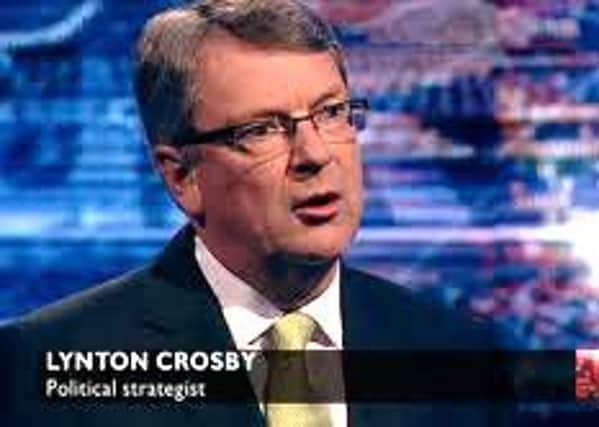Euan McColm: Behind political leaders’ smokescreens


That’s why David Cameron brought him in.
Crosby – an adviser to the Prime Minister since last November – is credited with sharpening up Tory attacks on Labour. If Cameron has seemed more focused in his exchanges with opposition leader Ed Miliband in recent months, say Conservatives, it’s down to this Australian guru, who has previously masterminded both of Boris Johnson’s successful London mayoral election campaigns.
The PM – however – loses that new clarity when it comes to the subject of Crosby himself. As well as being an advisor to the Tories in government, Crosby is a powerful lobbyist. His company – Crosby Textor – acts on behalf of tobacco company Philip Morris International which, along with others, has been vehemently opposed to plans, now dropped by the coalition, to introduce compulsory plain packaging for cigarettes.
Advertisement
Hide AdAdvertisement
Hide AdQuestioned repeatedly – by opponents and journalists – about a potential conflict of interest, the PM has sounded guarded, even evasive. Asked by Miliband at Prime Minister’s Question Time this week whether he had ever had a conversation with Crosby about plain packaging, Cameron said: “He has never lobbied me on anything.” There was no denial of a discussion on the matter. As an answer, it lacked Crosby-like certainty.
Subsequently Miliband wrote to Cabinet Secretary Sir Jeremy Heywood suggesting a conflict of interest which leaves Cameron open to the charge that he broke the ministerial code of conduct. We’ll hear from Sir Jeremy in full course when he explains why he has found no such breach (Cameron denies anything inappropriate and I’m certain the Cabinet Secretary will struggle to find anything that proves otherwise). Opposition politicians and officials – and I’ve discussed this with both Labour and SNP people – already know that, while an investigation into conduct is useful as a headline when it’s demanded, it’s not going to go anywhere.
Time and again, I hear the word perception around this issue. Cameron may not have actually, you know, done the slightest thing wrong here, but the perception is bad. That might not be entirely fair but is undoubtedly true.
Crosby’s links to a tobacco “giant” (the perfect shorthand for business at its most destructive and heartless) don’t require a great deal of spin. His firm takes cash to speak up on behalf of a company that sells something that kills its customers, necessitating the relentless attraction of new customers through expensive advertising campaigns. The coalition’s decision to drop the plain-packaging for cigarettes proposal collides uncomfortably with these facts of Crosby’s professional life.
Neither Cameron nor Crosby could blame any voter who chose to read the very worst into their professional relationship. In recent years, after all, we’ve learned that things we suspected might be shady – the MPs’ expenses system, the mechanism for paying off senior BBC staff, for example – actually were shady.
If this is a matter of perception, goes the logic, it must also be a matter of judgment. If a politician get into a situation which we might perceive – even if this requires the creative assistance of opposition politicians – to be dodgy, then what kind of judgment are we dealing with? But here’s a thing: if Crosby’s appointment is a matter of judgment, might it not, in this instance, be of the good rather than the bad variety?
Yes, the headlines around Crosby have been rough but Westminster has just gone into recess. Political news – without politicians to drive it – will lose momentum and there’s every likelihood that, by the time MPs return to the House of Commons in the autumn, this row will be all but forgotten.
Meanwhile, the Prime Minister and his colleagues seem to be reaping the benefits of Crosby’s advice. An ICM poll published this week showed labour losing its lead over the Tories, with both parties neck and neck on 36 per cent apiece.
Advertisement
Hide AdAdvertisement
Hide AdInterestingly, the majority of the Conservatives’ seven-point increase in fortunes has come at the expense of UKIP, whose poll ratings have fallen from 12 to just 7 per cent.
What happened in the weeks and months preceding the poll? Lots of things, but among them has been a series of presentations by Crosby and Cameron to Tory MPs. Crosby has urged Conservatives to focus clearly on Labour weaknesses and – and I suspect this is crucially important – calm down about the perception (there’s that word again) of a threat from Ukip.
If Crosby’s message continues to get through to Tory MPs, then a little rough and tumble in the Commons’ debating chamber and a cooked-up complaint to the Cabinet Secretary are more than a price worth paying.
There is no sign whatsoever that Cameron is inclined to act on the issues raised by his opponents. Crosby, currently employed for a day a week by the Conservatives, is expected to move into a full-time role as the party gears up for the 2015 election campaign.
Before he chose to raise this scandal (or matter of perception), Miliband was under considerable pressure from the Prime Minister over Labour’s relationship with trade unions. The accusation that Miliband was a puppet for union barons required a solid response. The suggestion that the PM is a puppet for business at its most cruel was a good effort.
Focus did shift away from “Ed the Puppet” to “Dave the Crony”. It was a decent political play from the opposition – but nothing more. Because the truth is that Labour isn’t genuinely concerned about Crosby bringing pressure from tobacco companies to bear on the Government. Ed Miliband is worried that Lynton Crosby is improving David Cameron’s game. «
Twitter: @euanmcolm